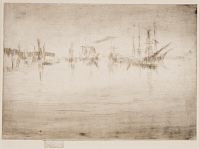Etchings Institutions search term: obach
Nocturne Shipping | ||
| Number: | 206 | |
| Date: | 1879/1880 | |
| Medium: | drypoint | |
| Size: | 157 x 222 mm | |
| Signed: | no | |
| Inscribed: | no | |
| Set/Publication: | no | |
| No. of States: | 5 | |
| Known impressions: | 8 | |
| Catalogues: | K.223; M.220; W.194 | |
| Impressions taken from this plate (8) | ||
TECHNIQUE
Howard Mansfield (1849-1938) commented, 'In impressions of the later states a night effect is given by extensive inking of the plate,' 9 and Whistler subjugated line to tone in printing those impressions. Whistler's fine drypoint work in the early states of Nocturne Shipping was sketch-like, rendering the subject somewhat difficult to read. However, in the last two states he appears to have underinked the lines intentionally, de-emphasizing particular details of ships and buildings on the horizon in favour of an overall nocturnal effect created with ink on the surface of the plate.
9: Mansfield 1909 (cat. no. 220).
PRINTING
Comparatively few impressions have been located. A very fine, atmospheric impression, printed in warm black ink with carefully wiped surface tone, but still showing signs of the burnishing required to tidy up the plate, was inscribed '1st proof' by Whistler ( ). Impressions of the second state are in dark brown ink on off-white laid paper (
). Impressions of the second state are in dark brown ink on off-white laid paper ( ) and in black ink on ivory laid paper with the watermark 'B / TH' in a decorative circle, a sheet removed from a book, with old Dutch inscriptions in brown ink on the verso (
) and in black ink on ivory laid paper with the watermark 'B / TH' in a decorative circle, a sheet removed from a book, with old Dutch inscriptions in brown ink on the verso ( ). No impression of the third state has been located. A couple of later impressions are in dark brown ink on cream laid paper (
). No impression of the third state has been located. A couple of later impressions are in dark brown ink on cream laid paper ( ,
,  ), and one in a lighter brown ink on ivory laid (
), and one in a lighter brown ink on ivory laid ( ). In some impressions of later states, heavier inking conceals the fact that the drypoint lines had worn down. The effects range from a nocturne (
). In some impressions of later states, heavier inking conceals the fact that the drypoint lines had worn down. The effects range from a nocturne ( ), to warm twilight (
), to warm twilight ( ).
).
 ). Impressions of the second state are in dark brown ink on off-white laid paper (
). Impressions of the second state are in dark brown ink on off-white laid paper ( ) and in black ink on ivory laid paper with the watermark 'B / TH' in a decorative circle, a sheet removed from a book, with old Dutch inscriptions in brown ink on the verso (
) and in black ink on ivory laid paper with the watermark 'B / TH' in a decorative circle, a sheet removed from a book, with old Dutch inscriptions in brown ink on the verso ( ). No impression of the third state has been located. A couple of later impressions are in dark brown ink on cream laid paper (
). No impression of the third state has been located. A couple of later impressions are in dark brown ink on cream laid paper ( ,
,  ), and one in a lighter brown ink on ivory laid (
), and one in a lighter brown ink on ivory laid ( ). In some impressions of later states, heavier inking conceals the fact that the drypoint lines had worn down. The effects range from a nocturne (
). In some impressions of later states, heavier inking conceals the fact that the drypoint lines had worn down. The effects range from a nocturne ( ), to warm twilight (
), to warm twilight ( ).
).
